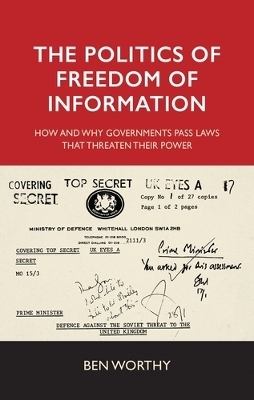
The Politics of Freedom of Information
How and Why Governments Pass Laws That Threaten Their Power
Seiten
2017
Manchester University Press (Verlag)
978-0-7190-9767-6 (ISBN)
Manchester University Press (Verlag)
978-0-7190-9767-6 (ISBN)
This book explores the implementation of the UK's FOI law under Tony Blair, showing how the radical policy was weakened by compromises and clandestine agreements before reaching the statute book, though it went on to be controversial and disruptive nonetheless. -- .
Why do governments pass freedom of information laws? The symbolic power and force surrounding FOI makes it appealing as an electoral promise but hard to disengage from once in power. However, behind closed doors compromises and manoeuvres ensure that bold policies are seriously weakened before they reach the statute book.
The politics of freedom of information examines how Tony Blair's government proposed a radical FOI law only to back down in fear of what it would do. But FOI survived, in part due to the government's reluctance to be seen to reject a law that spoke of 'freedom', 'information' and 'rights'. After comparing the British experience with the difficult development of FOI in Australia, India and the United States – and the rather different cases of Ireland and New Zealand – the book concludes by looking at how the disruptive, dynamic and democratic effects of FOI laws continue to cause controversy once in operation. -- .
Why do governments pass freedom of information laws? The symbolic power and force surrounding FOI makes it appealing as an electoral promise but hard to disengage from once in power. However, behind closed doors compromises and manoeuvres ensure that bold policies are seriously weakened before they reach the statute book.
The politics of freedom of information examines how Tony Blair's government proposed a radical FOI law only to back down in fear of what it would do. But FOI survived, in part due to the government's reluctance to be seen to reject a law that spoke of 'freedom', 'information' and 'rights'. After comparing the British experience with the difficult development of FOI in Australia, India and the United States – and the rather different cases of Ireland and New Zealand – the book concludes by looking at how the disruptive, dynamic and democratic effects of FOI laws continue to cause controversy once in operation. -- .
Ben Worthy is Lecturer in Politics at Birkbeck College, University of London -- .
1 FOI: hard to resist and hard to escape
2 From radical to inevitable: the development of FOI in Britain
3 New Labour, new openness?
4 The 1997 White Paper: a symbolic victory?
5 The 1999 draft Bill: the retreat becomes a rout
6 The Parliamentary passage: asymmetric warfare
7 FOI in the UK: survival and afterlife
8 The US, Australia and India: two firsts and the greatest?
9 Ireland and New Zealand: a legacy and an assault from within
10 FOI and the remaking of politics
Conclusion: why do governments pass FOI laws?
References
Index -- .
| Erscheinungsdatum | 20.03.2017 |
|---|---|
| Verlagsort | Manchester |
| Sprache | englisch |
| Maße | 156 x 234 mm |
| Gewicht | 517 g |
| Themenwelt | Recht / Steuern ► EU / Internationales Recht |
| Recht / Steuern ► Öffentliches Recht ► Verfassungsrecht | |
| Sozialwissenschaften ► Politik / Verwaltung | |
| Sozialwissenschaften ► Soziologie | |
| ISBN-10 | 0-7190-9767-3 / 0719097673 |
| ISBN-13 | 978-0-7190-9767-6 / 9780719097676 |
| Zustand | Neuware |
| Haben Sie eine Frage zum Produkt? |
Mehr entdecken
aus dem Bereich
aus dem Bereich
Buch | Hardcover (2024)
C.H.Beck (Verlag)
75,00 €


